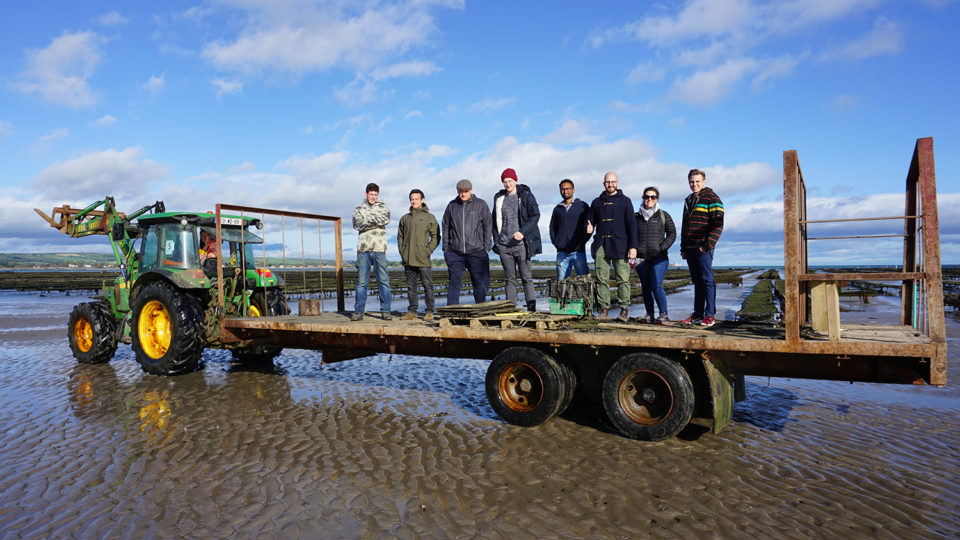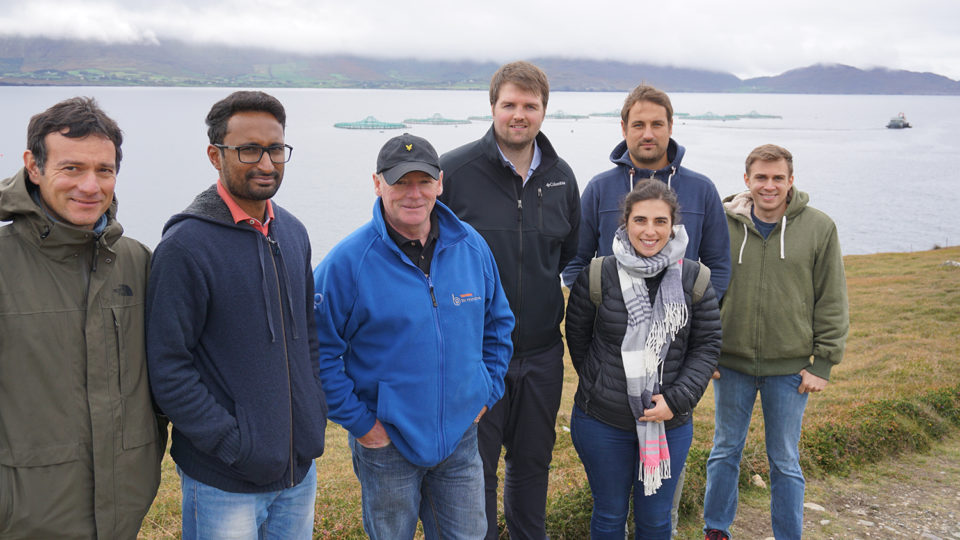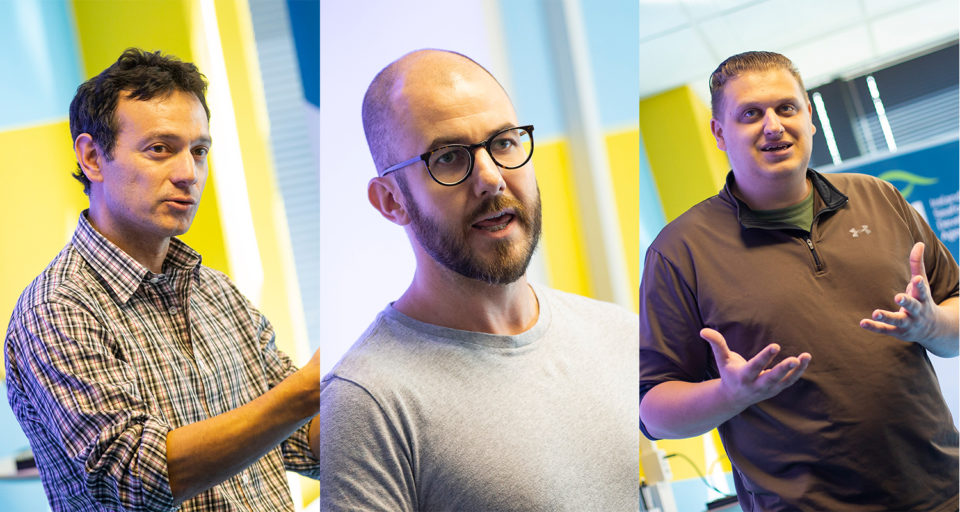In ‘de-risking’ investments, global aquaculture accelerator program delivers another strong cohort of startups

The Hatch aquaculture accelerator program is almost halfway through its three-month term in Cork, Ireland, where six entrepreneurs with innovative contributions to the industry are making connections with potential investors, experts and strategists.
For them, the process of attracting investors and customers they hope will herald a new growth curve for their respective businesses is an intense and immersive one. It requires them to leave their friends and family, travel to a new country and commit themselves to three months of round-the-clock work on their business, relegating all the usual, extraneous details of their lives to the back burner.
“Many would liken the Hatch accelerator program to an MBA for a startup,” said Wayne Murphy, co-founder and chief operating officer at Hatch. “You get a high concentration of input from experts and you have to be tough, smart and accountable to take in what really adds value to your business and drive it forward. Typically, a startup going through this program will develop by between 12 and 18 months in just three months.”
Murphy has run accelerator programs for several years and knows precisely what participating entrepreneurs need to be successful.
“It’s a real rollercoaster ride that demands commitment, mental toughness and accountability,” he said. “There are key performance indicators that the entrepreneurs must meet and achieve each week, because if they’re not progressing, then they’re dying. Their most precious resource is time, so every day they must be focused on moving forward, making new connections, trying out their products and doing something that will bring them forward.”
Participants submit a success report to the Hatch team each week, detailing their learning, improvements, goals and objectives for the week to come. The Hatch team works hard to make each entrepreneur successful, so it is crucial that each participant understand from the outset that what they put into the program has a direct correlation to what they will get out of it.
“It’s important for me to protect the dynamic we create for these teams to meet their potential, because if anyone is not pulling their weight, it infects the rest of the group,” Murphy said. “For us, the accelerator process is one of the best ways of de-risking our investment because every day I see how the teams perform in pressurized environments, their dedication, loyalty and commitment. These are all key performance indicators as to the results at the end of the process, and they signify to me that other companies will share and see that kind of commitment. These companies are ‘our product’ and we want to go to other investors and introduce them as teams that will deliver on their potential.”

For Dakota Hamill, Hatch is the opportunity to escape his comfort zone.
“You’re forced to live in a bit of discomfort and sacrifice a bit to have accelerated growth and to develop faster,” said the co-founder of Prospective Research, based in Beverly, Mass., USA. His company is developing adaptive probiotics for disease prevention in aquaculture, using beneficial bacteria to promote an immune-response to invasions of destructive bacteria. Hamill’s team has a patented probiotic for shellfish and is in the process of developing an additional two strains for disease prevention in shrimp and salmon farming.
“When I say discomfort, I mean that at any time someone can ask you to get up and talk about your company in front of a group, in very honest terms,” he said. “You have to be ready to be put on the spot, and if you don’t know the answers to questions then you’re embarrassed in front of everyone. You put in more work studying your trade to make sure that never happens again.”
Finding discomfort has its advantages, Hamill added. “You know it’s a short program so you are really committed to getting stuff done. On average, we’re working 10-to-12 hour days, but at the same time we’ve networked more in three weeks than we have in three years. Every week we’re in touch with potential customers or investors, large corporations, and it could only have happened via the connections we’ve made at Hatch.”
Evan Hall, co-founder and chief executive officer at Wittaya Aqua, agreed that the reward of participating in Hatch far outweighs the personal sacrifice of leaving friends, family and routine behind for three months.
“Being accepted to Hatch has boosted our credibility as a startup and is a big validation to what we’re doing,” he said. Wittaya Aqua aims to improve efficiency on aquaculture farms by helping farmers make better, more efficient and more sustainable feed management decisions. The company also provides nutritional modeling to smaller players in the feed industry.
“We’re like master chefs on the feed company side, providing recipes for the best feed for our clients,” he said.
Hall said there’s no better program than Hatch to network with industry leaders and gain access to a global network of successful aquaculture players.
“Their mentorship, knowledge, access and insight is extremely important in helping us grow,” he added. “But it’s also very cool to interact with the other companies participating in Hatch, to talk with them about solving problems in the industry and gain their insight into problems my company might be trying to solve.”

For example, as Wittaya Aqua researches the needs of shrimp farmers in Vietnam and Thailand, Hall has called on the advice and insight of a fellow Hatch member who is farming shrimp in India. The camaraderie between the group members is invaluable and energizing, he said.
Team bonding and collaboration are gently encouraged, Murphy said.
“We’re trying to build a network of likeminded people who want to help each other make aquaculture a fantastic business,” he said. “There’s competition, but it’s healthy. The teams regularly have discussions on how they approach things, and they help each other. We’ve found that after three months in the trenches people become friends for life, a relationship that builds up and stays with them way beyond the duration of the program.”
Hall said another useful aspect to his participation in Hatch is the mentorship of Murphy, Carsten Krome and the rest of the Hatch team.
“As a startup we’re always going through problems and it can be lonely being a CEO. It’s great to have the external opinion of the Hatch mentors, to bounce off the crappy stuff you’re going through,” he said. “They know you’re not Mark Zuckerberg yet and no one is expecting you to be. Obviously, you need to be polished, but there’s an acknowledgement that you’re human, you’re doing something difficult and that you’re not always going to be firing on all cylinders.”
Hamill advises entrepreneurs considering Hatch to go for it.
“Get out of the place where you feel safe and go to the other side of the world where you’ll meet new people every day,” he said. “Your business will be better for it, and you’ll probably be a better person for it, too.”
For Hatch team, investment in each cohort member is a long play with no returns expected for at least seven or eight years.
“The cost of the program is 8 percent of the shares of each of their respective businesses and in return we give them cash to cover accommodation, travel, legal assistance or whatever else is needed,” Krome said.
The team’s belief in the companies they select for participation drives them forward.
“I believe aquaculture requires a significant amount of talent to try and solve the problems facing the industry,” Murphy reflected. “Hatch can act as a catalyst to bring that talent forward and help aquaculture grow into a sustainable, well-managed industry.”
Follow the Advocate on Twitter @GAA_Advocate
Author
-

Lauren Kramer
Lauren Kramer is a freelance journalist residing in Richmond, B.C., who has written extensively about seafood marketing for SeaFood Business magazine and SeafoodSource.com. Her work appears in a number of publications, including the National Culinary Review and Flavor & The Menu.
Tagged With
Related Posts

Innovation & Investment
Aquaculture Exchange: Carsten Krome, Alimentos Ventures
A business accelerator helps small businesses grow and ready themselves to capitalize on institutional investment opportunities. Sounds exactly what the aquaculture industry needs. Carsten Krome tells the Advocate about the various business models his new firm is investigating.

Innovation & Investment
Now Hatching: Millennial duo’s aquaculture analytics software
In the first startup profile of the inaugural Hatch cohort in Bergen, meet two young software developers who left Washington, D.C., for Norway and the power of personal connections to grow their aquaculture analytics business.

Innovation & Investment
JALA engineering innovation for Indonesian shrimp farmers
A company in Indonesia hopes the vast network of shrimp farms throughout the country will adopt its IoT device, particularly when they’re on the go.

Responsibility
App aims to bring clarity to seafood traceability, social compliance data
For small-scale aquaculture farmers in far-flung regions, creating traceability data can present major challenges, both linguistic and technological. It’s those challenges that VerifiK8 is poised and ready to help solve.

